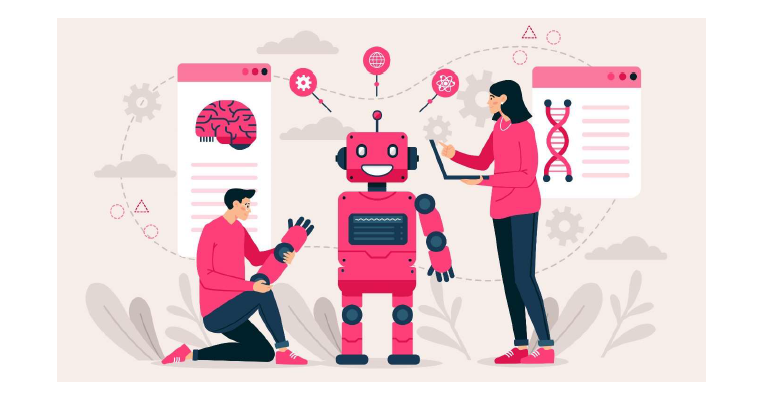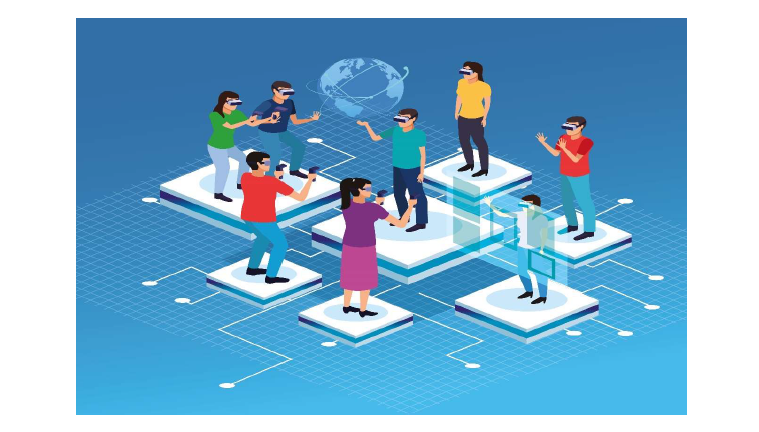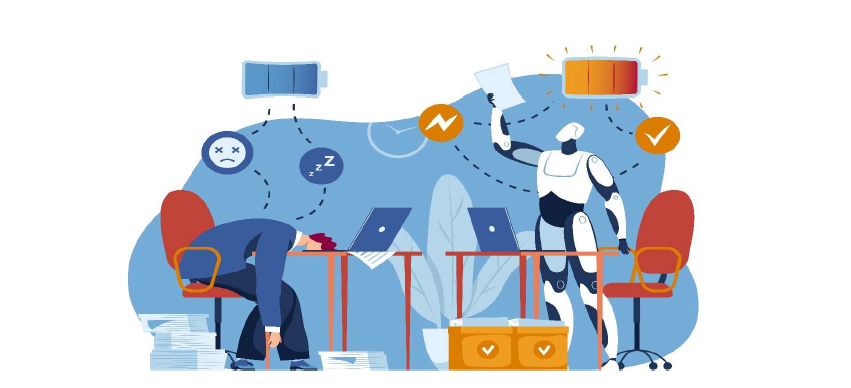
by Mansoor | May 3, 2024 | AI
The way we work is undergoing changes due, to the rise of intelligence
(AI). AI is transforming the workplace in ways that were once
unimaginable automating tasks and providing insights and
recommendations. It’s crucial to consider how AI will impact the future
of work as technology continues to advance.
Increasing Automation of Tasks
One of the advancements brought by AI to the workplace is the
automation of jobs. As AI progresses it can handle tasks that were
previously restricted to humans. For example AI powered systems can
now perform data entry, data analysis and even interact with
customers in customer support roles. This allows human workers to
focus on thinking, creativity and building relationships within their
professions.
The Growth of the Gig Economy
AI is also expected to influence the economy, where individuals work
as contractors rather than traditional full time employees. If more jobs
become automated there may be opportunities for employment
leading to an increased reliance on short term project based work. As
people move from project to project and job to job they may need to
be adaptable and flexible, in order to thrive.
The demand, for individuals with skills such as data analysis,
programming and machine learning is increasing due to the growing
utilization of AI in workplaces. As businesses strive to incorporate AI
into their operations and gain an edge there will be a demand for
workers who can comprehend and work with AI technology.
AI has the potential to create possibilities for collaboration between
humans and robots. For example AI powered chatbots can provide
customer service assistance while also gathering information to
enhance the customer experience. Additionally AI can facilitate
communication among employees working in locations enabling
successful and efficient team collaboration.
As AI becomes more prevalent in the workplace it raises concerns that
need consideration. If not developed and implemented thoughtfully
AI runs the risk of perpetuating existing biases and discrimination.
Furthermore we must consider the impact that increased automation
may have on workers in low paying jobs.
The future of work is expected to undergo changes due, to the
influence of AI presenting both opportunities and challenges.
Businesses and individuals need to stay updated on the
developments, in AI technology and adapt to the changing business
landscape. This way we can ensure that AI is used responsibly and
ethically with the goal of enhancing than diminishing our standard of
living and the quality of work.

by Mansoor | May 3, 2024 | AI
AI is rapidly transforming industries revolutionizing the way
businesses operate. With its ability to automate tasks and
complement efforts AI technologies offer avenues, for streamlining
operations enhancing productivity and fostering creativity.
Lets explore some examples of how AI’s poised to reshape the business
landscape
Data analysis
AI has the capability to sift through volumes of data,
uncovering patterns and insights that humans may overlook. By
swiftly and effectively collecting and analyzing data businesses can
gain understanding of consumer behavior, market trends and other
crucial indicators that drive decision making.
Personalization
Thanks to AI advancements companies now have the
means to provide tailored experiences for their customers. By
leveraging consumer data and behavior analysis AI powered systems
can recommend products and services that align with each individuals
interests and needs. This not enhances customer satisfaction but
fosters loyalty.
Automation
Through automating tasks and processes AI liberates
employees to focus on complex and innovative endeavors. For
instance in the sector AI powered robots can handle assembly lines or
quality control tasks with precision—boosting production rates while
optimizing efficiency.
Customer care
Chatbots driven by AI algorithms are now capable of
handling customer support inquiries accurately round the clock.
These intelligent chatbots ensure responses, to customer queries
while maintaining high service standards.
As we witness these transformations brought about by AI technology
across sectors it becomes clear that businesses stand to benefit
immensely from embracing these advancements.
This has the potential to enhance customer satisfaction while also
allowing human staff to focus on customer support issues.
Artificial intelligence can be of assistance, to organizations in
predicting when machinery and equipment are likely to malfunction
thus enabling maintenance before any issues occur. This could lead to
reduced downtime and increased productivity.
In summary AI will continue revolutionizing businesses across sectors
by introducing approaches to automate processes analyze data and
cater, to the unique needs of individual clients. To remain competitive
in the market businesses must. Integrate these advancements into
their operations as AI technology evolves.

by Mansoor | May 3, 2024 | AI
In fields artificial intelligence (AI) has brought about changes. It
continues to have a growing impact, on our lives. AI possesses the
ability to mimic skills like decision making, language translation and
visual perception. Think of it as a brain. While AI holds the potential
to revolutionize aspects of our lives it’s important to strike a balance
between its benefits and drawbacks. Here we explore both the
advantages and disadvantages of AI in our day to day routines like a
edged sword.
Advantages of AI
Enhanced Efficiency; AI powered machines are known for their
efficiency and productivity compared to humans. They can perform
tasks with speed and precision which proves beneficial across
various industries where accuracy and promptness are crucial.
Personalized Experiences; AI enables experiences for users by
providing product suggestions, individualized treatment plans or
customized learning environments. This not boosts customer
satisfaction. Also generates better outcomes.
Improved Safety; AI plays a role, in enhancing safety measures. For
instance self driving cars powered by AI can help minimize accidents
caused by errors. Additionally surveillance systems equipped with AI
capabilities can. Prevent activities effectively.
Analytics
Artificial intelligence has the ability to analyze amounts of
data in order to identify patterns and make predictions, about future
events. For example predictive analytics can be used to identify
individuals who’re at a risk of developing a specific disease, which
allows for early diagnosis and treatment.
Cost savings
AI has the potential to reduce costs for both businesses
and individuals by automating tasks that were previously carried out
by humans. Take AI powered chatbots as an example they can
provide round the clock customer support at a fraction of the cost of
hiring employees.
Drawbacks of AI
Job displacement is a concern when it comes to AI as many tasks that
were traditionally performed by humans can now be handled by AI
systems. This raises the possibility of job losses, in industries reliant
on manual labor leading to unemployment and income inequality.
Bias
The quality of an AI system heavily depends on the data it is
trained on. If biased data is used this can result in AI systems. Such
biases could lead to discrimination and other negative societal impacts. For instance studies have shown that facial recognition software tends to have error rates when identifying women or people with skin tones.
Security risks
As the use of AI becomes more widespread there is a
concern that it could be exploited for purposes such, as identity theft
or cyberattacks.
Considering the consequences of a security breach both businesses
and individuals should be deeply concerned, about it.
Concerns regarding privacy
The use of AI systems often involves the
collection and storage of amounts of data, which raises privacy
concerns. This is particularly relevant in fields where sensitive
personal information is frequently gathered and maintained.
Lack of transparency
As AI systems become more complex it can be
challenging to understand how they make decisions. This lack of
transparency makes it difficult to trust AI systems when they are
used to make decisions that impact peoples lives.
To summarize AI brings benefits such as productivity, customized
experiences improved security measures, predictive analytics and
cost savings. However there are also drawbacks like job
displacement, bias issues, security risks, concerns about privacy
infringement and a lack of transparency. To fully harness the
advantages while minimizing the risks associated with AI technology
it is crucial to develop and apply it ethically with an emphasis, on
transparency, accountability and fairness. By doing we can leverage
AI effectively for the betterment of everyones future.

by Mansoor | May 3, 2024 | AI
Artificial intelligence (AI) has become increasingly prevalent, in our
lives. We now have computer programs that’re capable of solving
problems making decisions and understanding language. These are
known as intelligence (AI) systems. With applications in fields such as
healthcare, banking, transportation and entertainment AI is becoming
deeply ingrained in our routines.
The impact of AI in the healthcare sector is particularly notable. AI
powered systems can analyze amounts of data to identify potential
health risks enhance diagnostic accuracy and create personalized
treatment plans. For example AI algorithms can assist professionals in
detecting and diagnosing diseases like cancer at a stage ultimately
leading to improved patient outcomes. By harnessing the power of AI
healthcare practitioners can effectively manage information. Deliver
better care and treatment.
The banking industry is also experiencing changes due, to the
integration of AI technologies. Sophisticated tools driven by
intelligence are capable of analyzing volumes of financial data to
detect fraudulent activities identify investment opportunities and
predict market trends. This empowers professionals to make
decisions and effectively manage risks. For instance AI systems can
analyze stock market data to forecast which stocks may increase or
decrease in value—thus enabling investors to make investment
choices.
AI is gaining usage in the transportation industry. For example self
driving cars rely on AI to determine when to turn, accelerate or brake.
This technology has the potential to minimize accidents caused by
error and enhance safety and efficiency on the roads. Additionally AI
is being employed to improve aspects of transportation such, as traffic
control, public transit systems and logistics. These advancements
contribute to environmentally friendly transportation systems.
Moreover AI is revolutionizing the entertainment sector by
personalizing recommendations for movies, TV shows, music and
other types of content based on user interests and behavior. This
enhances the user experience and increases engagement and
satisfaction for viewers. Furthermore AI enables the creation of forms
of entertainment, like narratives virtual/augmented reality
experiences and interactive games.
In conclusion AIs significance continues to grow across industries
including healthcare, banking, transportation and entertainment. As it
progresses further in its development journey we can expect
applications that will benefit society as a whole while enhancing our
daily lives.

by Mansoor | May 3, 2024 | AI
Artificial intelligence (AI) has gained popularity due, to its potential to
revolutionize industries, such as healthcare, banking and
transportation. However like any technology there are concerns
associated with its use.
One major concern is the loss of jobs. AI has the capability to automate
tasks currently performed by humans which could lead to job
displacement. For example customer care agents might be replaced
by chatbots and human drivers could be substituted by self driving
cars. While AI may create job opportunities those whose roles are
being automated might face challenges in adapting during this
transition.
Another risk is the possibility of bias in decision making. AI algorithms
heavily rely on the data they are trained on meaning that if the data
itself is biased so will be the conclusions reached by the AI system.
This bias can perpetuate inequity or prejudice if certain groups of
people—, for instance minorities or women—are underrepresented
or misrepresented in the data provided to AI systems.
Privacy is also a concern when it comes to AI technology.
The vast amount of data that AI systems collect and analyze enables it
to be used in ways that violate standards and privacy laws. For
example AI systems could secretly monitor employees. Use facial
recognition technology to track individuals without their consent.
Another concern is the loss of control caused by AI. As AI systems
become more advanced, managing and understanding them may
become increasingly difficult. This could lead to consequences or even
catastrophic disasters. If an AI system were given control over a power
plant or a military weapon for instance a programming error or failure
could have effects.
Lastly there is the possibility that AI could be used for purposes such,
as cyberattacks or the development of weapons. As AI technology
advances these systems may become capable of carrying out attacks
without intervention making them difficult to counter.
In conclusion despite the benefits of AI there are also inherent risks
associated with its widespread adoption. It is crucial that we proceed
with caution, in developing and applying AI taking precautions to
mitigate risks and ensure ethical use.
This involves addressing issues such, as bias, privacy and governance
while also ensuring that the benefits of AI are shared equitably among
all members of society. The key to maximizing the advantages of this
technology while minimizing its risks is, by taking these steps.





